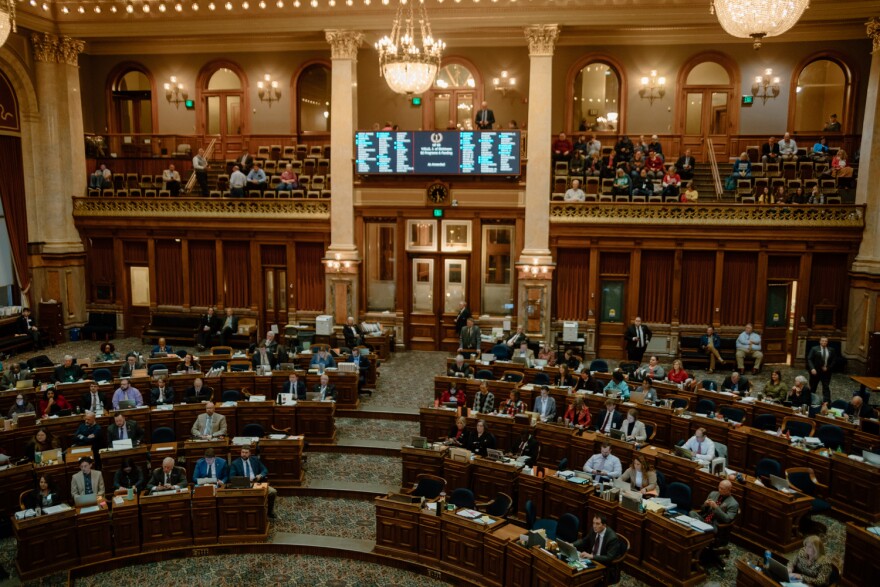Iowa House Republicans passed two bills Tuesday targeting diversity, equity and inclusion in state agencies and higher education amidst pushback from House Democrats.
The bills comes as the state has moved to restrict DEI across higher education in recent years.
Last year, the Legislature banned funding and maintaining DEI offices and positions at the state’s regents institutions. In November 2023, at the direction of the governor, the Board of Regents adopted 10 directives aimed at restricting DEI policies and initiatives on campus, and promoting free speech and civic education.
In a news release from the Iowa House Republicans, Rep. Taylor Collins of Mediapolis said higher education is facing “critical issues,” such as “out of control costs” and “a lack of intellectual diversity on campus.”
“We’ve done great work over the past two years in ridding identity politics from our state’s public universities and instead embracing intellectual diversity, but a holistic look at the crises facing our higher education system and the state’s workforce needs was long overdue,” he said.
Ahead of Tuesday’s House debate, most members of the Iowa Legislative Black Caucus emailed a letter to Iowa House representatives in response to legislation targeting DEI.
The letter called DEI “not just a moral obligation,” but a “pathway to innovation, understanding and collective growth." It also called embracing DEI “essential to our civil rights.”
“When we celebrate our differences, we create a vibrant and dynamic space that fosters creativity and problem solving,” the letter stated. “By addressing systemic barriers, we create an environment where everyone has a chance to thrive… Inclusion strengthens teams, enhances decision making and promotes social cohesion.”
Blocking universities from requiring courses with DEI and CRT-related content
The GOP proposal would block regents institutions from requiring students to take courses with DEI and critical race theory-related content.
Legal Defense Fund, a legal organization focused on racial justice, defines critical race theory as an “academic and legal framework that denotes that systemic racism is part of American society.”
The bill defines “diversity, equity and inclusion and critical theory-related content” as material that suggests colorblind laws, policies or institutions perpetuate oppression, injustice, race-based privilege or inequity. It also includes content that promotes “the differential treatment of an individual or groups of individuals based on race or ethnicity” or suggests a student is biased because of their race or sex.
Rep. Beth Wessel-Kroeschell, D-Ames, spoke against the bill, saying college education should be about self discovery, not censorship.
“Diversity, equity and inclusion helps us understand our cultural differences,” she said. “It is the right thing to do, and it is good for Iowa."
Rep. Steven Holt, R-Denison, pushed back on that, and said DEI is doing the opposite of what it claims and shames individuals based on their race. He said a better name for DEI programs would be “adversity, inequity and exclusion.”
"In my opinion, DEI at its core, is racist, which is one of the reasons we are becoming so divided as a nation.”Republican Rep. Steven Holt
“I wish that DEI was as noble as has been suggested on the floor of this chamber,” he said. “I wish it taught us to celebrate our differences, but it doesn't. In my opinion, DEI at its core, is racist, which is one of the reasons we are becoming so divided as a nation.”
Rep. Ross Wilburn, D-Ames, said “students don’t know what they don’t know” and that taking DEI and CRT content out of required courses will hinder students from being exposed to new perspectives.
“We don't want to stop them from requiring courses because they don't know that it will help them prevent misunderstandings and conflict that often result in human resource complaints, as well as lawsuits,” he said.
Under the bill, universities also couldn’t require or incentivize faculty to cover DEI and CRT-related content or participate in professional development with DEI or CRT-related content. They also couldn’t require instructors to curate class materials based on an author’s race, sex or gender identity.
Degrees, minors or other certificate programs focused on “racial, ethnic or gender studies” would be allowed to require DEI or CRT-related courses.
The bill mirrors a model policy published by the American Legislative Exchange Council last year. The national nonprofit organization has historically promoted legislation with conservative stances.
The bill passed 63-34 with one Republican — Rep. Matthew Rinker of Burlington — voting 'no' alongside House Democrats. It now heads to the Senate.
A previous version of the bill included the topics systemic racism, microaggressions, intersectionality, social justice, race-based reparations, race-based privilege or race of gender-based inclusion in the definition of DEI and CRT-related content.

Banning DEI offices at state entities, community colleges and private colleges
House Republicans also passed a bill Tuesday that would prohibit state agencies, cities, counties and school districts from spending money on DEI offices and staff, except when it’s required to comply with a federal contract.
Iowa Legislative Black Caucus Chair Rep. Ruth Ann Gaines, D-Des Moines, said she has worked as a diversity trainer for educators for 46 years, and now she's being asked to take the word “diversity” out of her courses. She said she’s put a lot of work into helping people understand and appreciate differences.
“Things are changing quickly, and it saddens me,” Gaines said. “Because I feel that I am going to leave this world thinking that all the work that I have done is going to be eliminated.”
"It simply blows my mind that we are here telling private organizations and businesses what they can and cannot do."House Minority Leader Jennifer Konfrst
Rep. Henry Stone, R-Forest City, said, as an Asian American person, he understands what it’s like to experience stereotyping and racism. But he said “getting rid of DEI” will help the country “heal and grow together.”
“DEI only wants to look at what can be viewed from the outside, and not what a person brings to the table in their skills and abilities,” Stone said. “DEI creates divisiveness and animosity towards one another.”
Stone, the bill’s floor manager, refused to answer Democratic lawmakers’ questions during debate, saying they should have asked him questions before the public debate.
The bill was amended to include a ban on DEI offices and staff at private colleges and community colleges, aligning them with DEI restrictions for public universities passed last year. If a private college violates the bill, it wouldn’t be able to participate in the Iowa Tuition Grant program for the following year, which provides scholarships to Iowa residents.
House Minority Leader Jennifer Konfrst, D-Windsor Heights, said the bill would tell students they can’t go to a private college that doesn’t agree with the Republican majority’s opinion about DEI programs.
“Why not allow us to have these conversations in our institutions, rather than shutting us up and telling us you don’t like these political thoughts, so therefore no one can have them?” she said. “It simply blows my mind that we are here telling private organizations and businesses what they can and cannot do. And we’re punishing the students who get those grants.”
Stone said the state must stop teaching “DEI ideology” to kids, which he said teaches them to look at skin color before anything else.
The bill says it is not intended to affect funding for academic course instruction, research, production of creative works, arrangements for guest speakers, mental or physical health services, and activities of registered student organizations.
The bill passed 61-37, with four Republicans joining all Democrats in voting against the bill. It now goes to the Senate for consideration.






